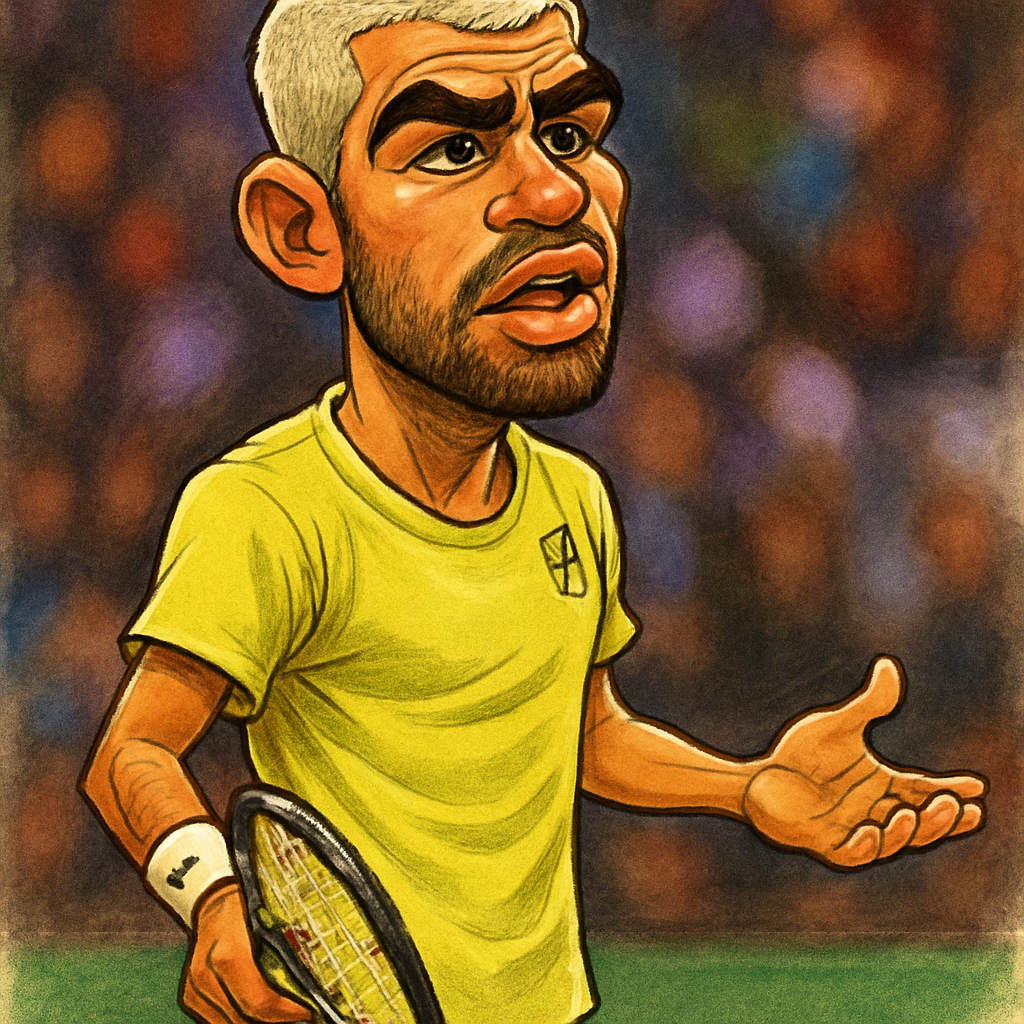LONDON — In the high-stakes world of professional tennis, first impressions can be everything, and they are not always favorable. For WTA star Paula Badosa, her initial assessment of fellow Spaniard and global sensation Carlos Alcaraz was decidedly mixed, a sentiment she has now publicly and candidly reversed.
Badosa, a former world No. 2, recently shared a surprising revelation on the *Tennis Connected* podcast, admitting that she did not always hold the warmest feelings towards the young phenom. "I have to be honest," Badosa confessed, "at the beginning, I didn’t really like his manner."
The Initial Friction: A Clash of Personalities?
Badosa's comments point to a period before Alcaraz's stratospheric rise to the top of the sport, a time when his on-court exuberance and seemingly boundless energy could be misinterpreted. She suggested that his vibrant, celebratory nature during matches initially rubbed her the wrong way. "I think he was very, you know, 'up' all the time, and very enthusiastic," she explained, hinting that his perpetual positivity may have come across as overwhelming or even insincere to some observers.
This initial perception is not uncommon in sports, where the confidence of a young, emerging talent can sometimes be misread as arrogance. The tennis tour is a pressure cooker, and players often form quick judgments based on limited interactions in competitive environments. For Badosa, who has been open about her own mental health struggles with anxiety, Alcaraz's unflappable, high-octane demeanor may have initially created a sense of distance.
A Change of Heart: Getting to Know the Real Carlos
The turning point for Badosa came not from watching Alcaraz win Grand Slams, but from getting to know him personally off the court. As their paths crossed more frequently on tour and within the close-knit Spanish tennis community, Badosa's perspective underwent a complete transformation. She discovered that the on-court persona was merely a fraction of the whole person.
"But then, when I got to know him, he’s one of the best guys I’ve ever met," Badosa effused. "He’s super humble, super nice. He always says hi. He’s always with a smile. So, I changed my mind completely."
This insight into Alcaraz's genuine character aligns perfectly with the image he projects in interviews and behind-the-scenes features. Coaches, rivals, and veterans of the sport consistently praise his grounded nature, a trait often attributed to his upbringing in the small town of El Palmar, Murcia, and the strong family values instilled by his father and grandfather.
The Alcaraz Effect: Humility Amidst Greatness
What makes Alcaraz's story so compelling is his ability to maintain a childlike joy for the game while shouldering the immense pressure of being the heir apparent to the 'Big Three'. Badosa's revised opinion underscores a key aspect of his appeal: his authenticity. The "manner" she initially questioned is not an act, but an organic expression of his passion.
This is further evidenced by his interactions with legends of the sport. Rafael Nadal has frequently spoken of Alcaraz's "good values," and Novak Djokovic has praised his "very nice personality." Such endorsements from his toughest competitors highlight a universal respect that transcends rivalry, something rarely seen at the pinnacle of any sport.
Badosa's testimony adds a powerful layer to this narrative. Her initial skepticism and subsequent conversion serve as a testament to Alcaraz's true character. It's one thing to be liked when you're winning; it's another to win over a critic through sheer genuineness. Her comments highlight several key traits that define the real Carlos Alcaraz:
- Authentic Humility: Despite his fame, he remains approachable and respectful.
- Innate Positivity: His smile and greetings are consistent and sincere.
- Grounded Nature: Success has not eroded his core values.
- Respect for Peers: He maintains positive relationships on tour.
This aligns with observations from his team. His coach, Juan Carlos Ferrero, has often stated that his primary job is not to teach Alcaraz how to play tennis, but to help him manage the circus that surrounds a global superstar, ensuring his protégé never loses the humble and hardworking essence that got him to the top.
A Lesson in Perception and the Power of Authenticity
Paula Badosa’s candid reflection offers a valuable lesson in the dangers of snap judgments, especially in the hyper-competitive world of professional athletics. Her willingness to publicly admit she was wrong about a colleague is as refreshing as it is rare. "I changed my mind completely," is a simple yet powerful statement of growth.
For Alcaraz, this episode is merely a footnote in a career destined for greatness, but it reinforces the image of a young man whose character is as robust as his forehand. In an era where sports stars are meticulously packaged and marketed, Alcaraz’s unvarnished enthusiasm and inherent kindness break through the noise.
He represents a new generation of champion—one who is fierce and uncompromising between the lines, yet gracious, humble, and universally well-liked the moment he steps off the court. Badosa's story confirms that the "manner" she once questioned is not a flaw, but the very source of his magnetic charm and the key to his widespread appeal.
As Badosa concluded, the real Carlos Alcaraz is not just a phenomenal tennis player; he is "one of the best guys" in the game. Her changed mind is a powerful endorsement, proving that while his tennis captivates the world, his character is what truly wins people over.

